Annual Review 2022
Danish Technological Institute
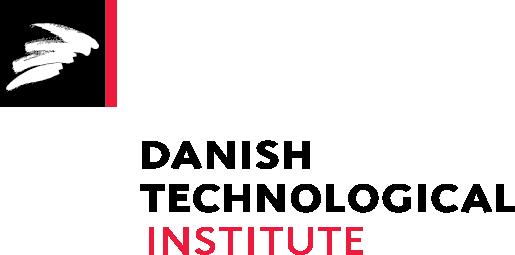




42,000 10,500
4.7
The assessment is based on responses from 2,481 customers in 2022 and is the customer satisfaction rating on a scale of 1-5.
Source: The Institute’s customer satisfaction survey
1,050 10th. 93%
In 2022, the Institute was named the 10th. most attractive workplace in Ingeniøren’s (a Danish engineering magazine) image survey. The survey was based on responses from 6,395 students and graduates working with engineering science, natural science and IT.
93% of the Institute’s employees either ‘agree’ or ‘completely agree’ with the statement: “In most areas, the Institute is my ideal workplace.” The total employee evaluation is based on responses from 904 employees which represent 91% of the Institute’s workforce.
Source: The Institute’s employee satisfaction survey
Three crises are impacting society and the business community in 2022: the climate crisis, the geopolitical crisis and the threat of a recession. The first crisis calls for green solutions and global collaboration, the second calls for regional technological sovereignty and the third crisis calls for improving the competitiveness of individual companies and strengthening resilience against broken value chains.
In the words of our founder, Danish Technological Institute’s mission is to “place ourselves where we suspect the Institute’s help will be necessary,” i.e., where society and companies need us to be. The Institute is part of a supporting infrastructure that ensures that companies and society emerge stronger from transitions and take advantage of the business opportunities that such transformations open up for us. This role is played out on a daily basis when the Institute provides specific technological solutions that accelerate the development of specific services or products. We make available our knowledge, network and laboratories which create industryready specific solutions that correspond to the needs of individual companies and the market.
The Institute must constantly remain on the cutting edge and develop itself. It also requires that we work closely together with the business community, actors working with innovation, business promoting systems and the authorities.
 Jens Maaløe Chairman Mikael Bay Hansen Acting Chairman
Juan Farré CEO
Jens Maaløe Chairman Mikael Bay Hansen Acting Chairman
Juan Farré CEO
In 2022, the Institute prepared a comprehensive selfevaluation that really highlights the Institute’s work and enthusiasm. The Institute continues to play a critical societal role and it has a major impact on the business community’s ability to be innovative and competitive.
This is not least realised in the 40,000 specific solutions that the industry provides to 10,000 customers on an annual basis. The solutions are (besides being a stamp of approval from the business community) an indication that the Institute has the correct partnerships and facilities for testing and demonstration and the right equipment and specialists with deep insights into technology and domain awareness.
Despite major restructuring in recent years, the Institute has continued to have a central and relevant position in the Danish and European innovation system. The Institute plays an active role in all our Innomissions, it coordinates several broad partnerships and it participates in the majority of the clusters and commercial lighthouse projects.
The Institute has also had a good start in the new Horizon Europe programme. The Institute participates in 17 different projects that were granted a total grant sum to the Institute of DKK 111 million in 2022. The Institute has also, for the first time, been active in and won projects from, among others, the Digital Europe programmes.
An Institute that is soundly operated and growingboth financially and organisationally Danish Technological Institute’s growth rate in 2022 was 7%, and the uninterrupted financial stability through several decades shows the Institute’s strength and relevance throughout time. When the Institute manages to achieve growth in a year characterised by uncertainty and in the wake of a global pandemic, it is because of the Institute’s ability to continually develop business models and to be agile in transforming its business to meet the needs of companies and society. In a time where there is a great demand for labour, it is vital that the Institute is an attractive workplace. This is confirmed by our ranking as number 10 in Ingeniøren’s image analysis of 2022 and our ranking as number 11 in Universum’s survey in 2022. As in previous years, the Institute’s employees have shown great dedication and pride in being part of the Institute. In the Institute’s latest employee survey, 96% of employees responded that they feel pride in working at Danish Technological Institute. The Institute’s good reputation as a workplace resulted in 195 recruitments in 2022 - a record year in terms of hiring competent specialists.
In 2022, the Institute has worked on creating visibility about the Institute’s work via initiatives in both print media - press releases and opinion pieces - and on social media. There has also been a massive effort to ensure that the Institute and the GTS system’s work is
topical and known of by relevant actors in the business community’s interest organisations and the innovation and business promotion system.
Look ahead, ahead!
Danish Technological Institute looks forward to contributing with specific solutions for individual companies while also building and maintaining strong and innovative ecosystems where the entire value chain works together to create future-oriented solutions that address the big transitions and market opportunities that follow.
In 2023, the Institute will position itself even stronger in the fields of energy, materials and food products. With the establishment of a division that collects the activities within food products and production, strategic CCUS (Carbon Capture, Utilization and Storage) and PtX (Power-to-X) and a close collaboration with 19 advisory boards about key focus areas in the green transition, we look forward to being an even stronger partner for the business community.
The solutions we build together will both create the green transition, strengthen Europe’s technological sovereignty and create resilience in the face of a looming recession and a geopolitical scenario that challenges our supply security and the global value chains. In a time of change, we will seize the opportunities for strengthening Denmark and increase the competitiveness of Danish companies.
Look ahead, ahead! Look for the roads ahead that will pave the way for development, and then place yourselves where you suspect the Institute’s help will be necessary. Do not wait until new lands are reached by the old, paved roads. The path will often take unknown routes and shortcuts, and detours cannot be avoided either, but it is better to take this risk than to be too cautious and only follow the familiar serpentine road forwards and upwards, only to find at the end of the road that you arrived too late.
Danish Technological Institute is an independent and non-profit research and development institute that is approved as a GTS institute by the Minister for Higher Education and Science.
Since 1906, the Institute has worked to promote the utilisation of technological progress for the benefit of trade and industry and society through development, advisory services and communication.

We fulfil this purpose by developing new knowledge through research and development activities that are translated into technological services and made available on market terms.

In 2022, Danish Technological Institute achieved 7% growth in revenue. The commercial revenue from Danish commercial customers grew, which testifies to even greater interactions with Danish companies. The Institute has maintained its R&D revenue despite an incredibly competitive market. In 2022, the Institute received recordhigh R&D grants and this ensures a strong portfolio in the coming years.

The group’s commercial revenue by type of customer in 2022
Development in distribution of the group’s total revenue from 2018 to 2022. The decrease in international revenue is due to selling a Swedish subsidiary in 2020.


Each year, the Institute delivers 42,000 specific solutions for 10,500 satisfied customers. The Institute is relevant to Danish companies and has broad interactions with them both in terms of regional distribution and company sizes.
9,200
The Institute’s customers are from all over Denmark. The number of customers by region is stable and its distribution is in line with Denmark’s general regional distribution of companies.
1,300 International customers
785 North Denmark Region 2,239 Central Denmark Region 1,731 Region of Southern Denmark 1,195 Region Zealand 3,315 Capital Region of DenmarkThe number of the group’s Danish commercial customers in 2022 divided by size.
The group’s commercial revenue divided by types of services in 2022. Primary product sales are through the subsidiary Danfysik.
35% Advisory services, consultancy services and commercial R&D
93% We benefitted from the collaboration with Danish Technological Institute.*
49%
The collaboration resulted in with products or services that were new to the market.*
38% The collaboration resulted in products or processes that are relevant to digitalisation or automation.*
47% The collaboration resulted in products or services that are relevant to sustainability or the green transition.*
*Source: Customer survey in 2022. Based on responses from 368 customers who bought services related to the testing, demonstration or development of production processes, production technologies, products and/or services at Danish Technological Institute. The responses were weighted by the industry, size and total purchases of companies from Danish Technological Institute.
1,287 Medium-sized companies 6,302 Small companies 671 Large companiesDespite a high degree of competition for R&D funds, the Institute still continues to succeed in bringing home market-relevant R&D projects and in establishing R&D partnerships with Danish companies. In 2022, the Institute brought home a record-high amount of R&D grants from both national and international sources which will ensure the development of relevant knowledge and technology that can be converted into concrete solutions. Every time the Institute secures one euro in R&D funds, three euros are secured for the project partners.
380
R&D projects
59
EURm in R&D activities, including self-financing
Shows the external financing for Danish Technological Institute for in-progress R&D projects.
*The hit rate concerns the projects that the Institute has applied for in 2022
*The amount concerns the 16 projects the Institute has brought home from Horizon Europe in 2022
16 Projects
The group’s R&D partnerships consisting of Danish and international research institutions in a formalised partnership and companies that are part of co-financed R&D projects.
218 Danish research institutions
924 Companies
347 Foreign research institutions
26%
Hitrate Hit rate for projects applied to*
23 EURm
Total budget for Danish partners**
In 2022, the Institute invested EUR 7.1 million in tangible fixed assets - mainly in the form of equipment for the Institute’s high-tech testing, demonstration and development facilities. The investments in equipment and facilities are a critical factor in allowing the Institute to complete research and development activities and to provide concrete solutions based on customers’ needs. The technological progress will keep accelerating and will require more investments in equipment as the companies’ need for access to advanced equipment grows.

In May, the Institute’s new HVAC interior climate laboratory was opened. The laboratory is one of the world’s most advanced interior climate laboratories which, with its enormous complexity, is tailor-made for the development and testing of HVAC components and systems. In the new laboratory, the Institute tests interior climate solutions and HVAC technologies for commercial customers and as part of research and development projects on both the component and system level. The laboratory is primarily for Danish and international producers and developers and end users in the construction industry.
The Institute’s new facilities offer testing for the development and scaling up of biosolution processes or products that are key to the development of plantbased food products, new ingredients and for the utilisation of all by-products from the agriculture and food industries. The bioprocess plant can be used by companies to develop, test, validate and scale up processes related to bio refining, fermentation and downstream processing.
70
Testing, demonstration and development facilities
In October, the Institute opened FastChargeLab which supports the development of energy storage technology and the use of battery systems. Specific activities include the research, development, testing and validation of batteries that are able to handle the high currents that fast charging technology requires. FastChargeLab is targeted at the industrial sector’s need for developing and testing effective battery-driven products for the purpose of getting competitive Danish solutions out on the market.
In December, the Institute opened a new fungus laboratory that offers qualitative and quantitative analyses for mushroom growth in materials from the construction industry and samples taken in buildings where there is a suspicion of fungal issues. The laboratory also offers mycological quality management that handles urgent issues with yeast and mould problems in all parts of the chain from production, warehousing, preprocessing for transport and sale within, for example, the agrobusiness and food industry, the biotech and pharmaceutical industry and the non-food industry.
The laboratory carries out standardised tests with fungi and also participates in fungus-related research and development tasks for both Danish and international customers.
15,000
Laboratory tests and samples
The construction of the lab was supported by the Danish Energy Agency under Green Labs DK. FastChargeLab is supported by the EUDP, under the Danish Agency, and Green Labs DK. The laboratory is part of the regional lighthouse project called Biosolutions Zealand.Employees are a critical factor in the Institute’s work and its ability to serve the Danish business community with professional expertise and the future’s technological solutions. Therefore, there is a major focus on attracting, retaining and developing skilled employees who can help equip Danish companies to address the domestic and international challenges. Employees perceive Danish Technological Institute is a company that is making a difference and which offers exciting professional challenges with room for personal development.
1,050
World-class employees
10th.
In 2022, the Institute was named the 10th. most attractive workplace in Ingeniøren’s (a Danish engineering magazine) image survey. The survey was based on responses from 6,395 students and graduates working with engineering science, natural science and IT.
195 Newly hired employees
85% A high degree of employee satisfaction
The total employee evaluation is based on responses from 904 employees which represent 91% of the Institute’s workforce.
Source: The Institute’s employee satisfaction survey

As a highly specialised knowledge company, Danish Technological Institute is constantly working on attracting and developing the best talent. Therefore, Danish Technological Institute is constantly focused on diversity and being an inclusive workplace with room for many types of people. This diversity helps to promote groundbreaking research, development and innovation at the highest level. The Institute is also continually working on ensuring equal opportunities at all levels of employment.
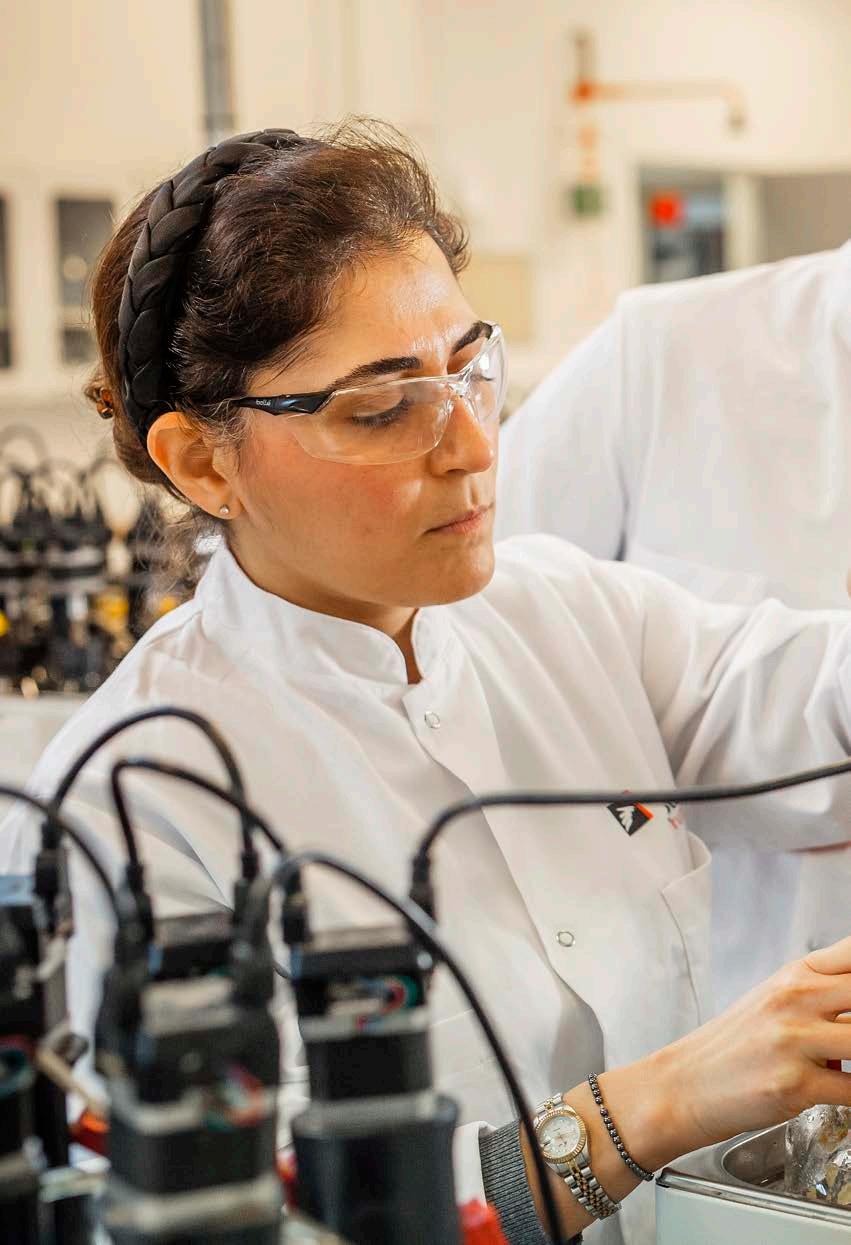
Gender distribution among employees
37% Women
63% Men
Gender distribution in management tiers
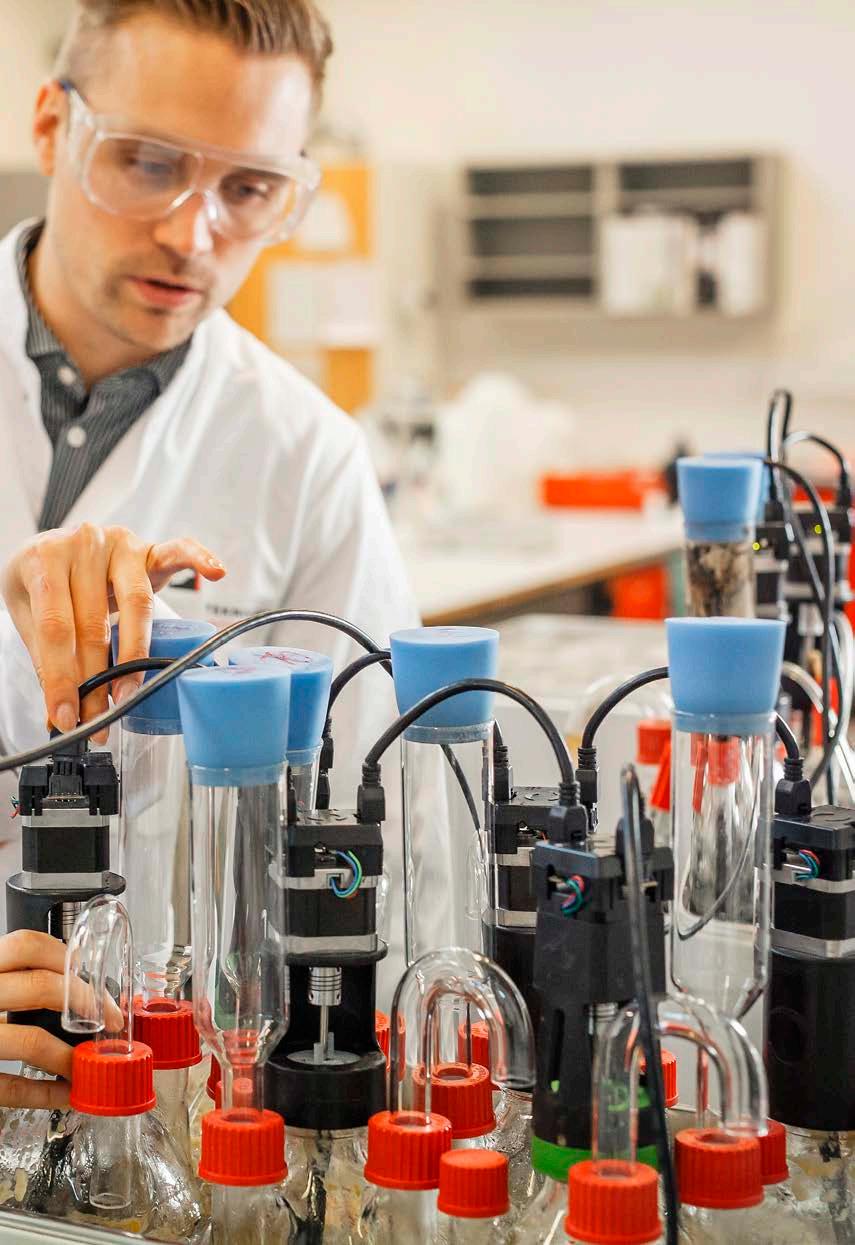
34% Women
66% Men
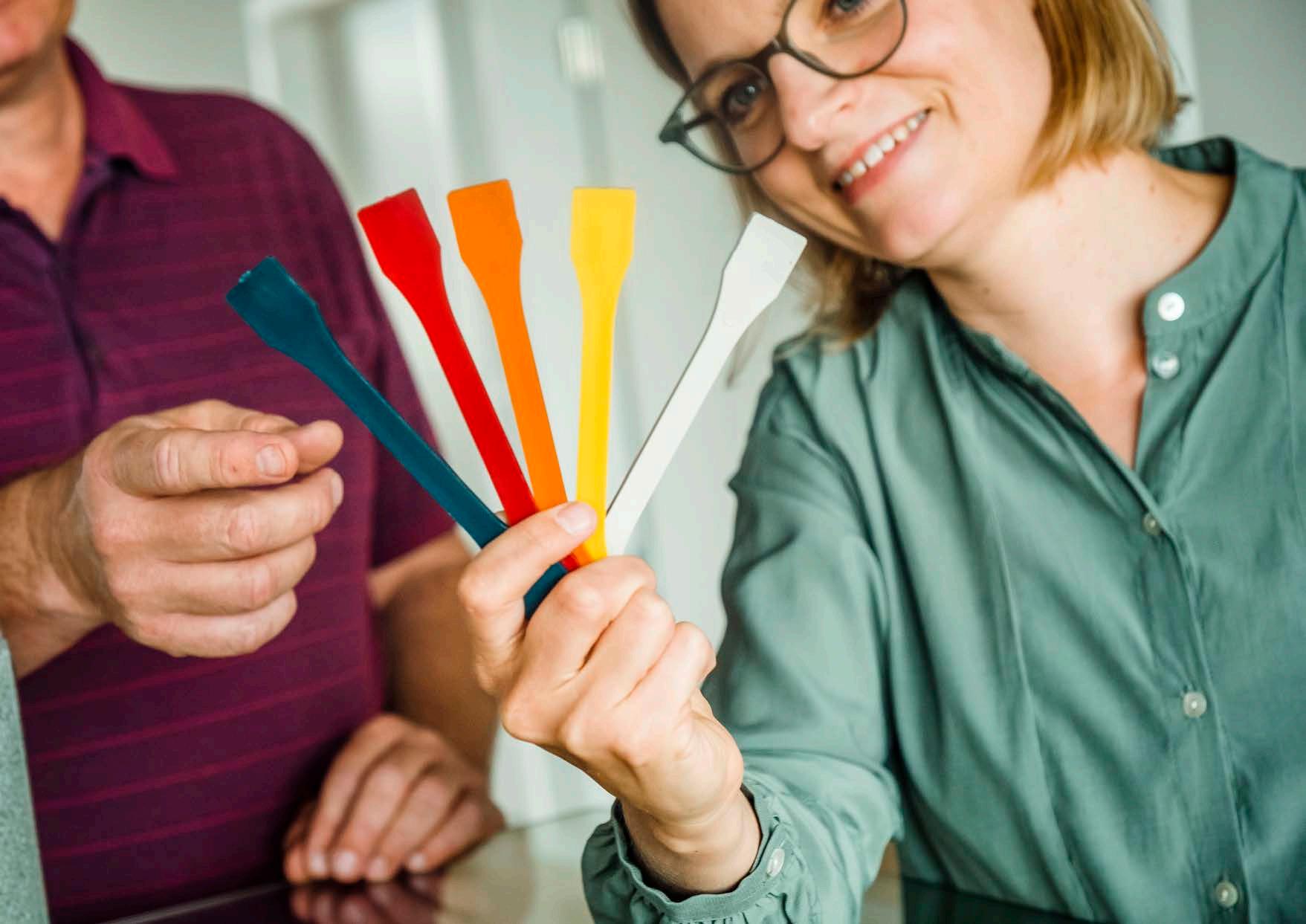
The climate impact of construction materials is a critical factor in the CO2 accounts
Danish Technological Institute operates the secretariat for Videncenter om Bygningers Klimapåvirkninger (VCBK). VCBK offers guidance to the entire construction industry, including construction clients, advisors, contractors and builder, plumber, electrician, etc. companies. The goal is to increase the industry’s knowledge about climate requirements in the building codes and to build up competences in documenting the total climate impacts of new construction projects.
With VCBK, the actors in the construction sector can stay up to date about the new climate requirements in the building codes, find guidelines and instructional materials that they can use as they wish and there is also a case library with examples of already completed new construction projects.
I have gained a lot from participating in VCBK’s network meeting about climate requirements and LCA. Besides getting a network and exchanging knowledge and ideas with the other participants, I have also received answers to a number of questions so that I can better prepare my company.
Louise Nørregaard Jakobsen, consulting engineer at AFRYSince VBCK started in March 2022, VCBK has responded to inquiries about climate requirements from around 300 actors in the construction sector, has had more than 500 people sign up for the regional network meetings and been in touch with about 950 participants via webinars.
VCBK is anchored under the Danish Agency for Social Affairs and Housing and acts as a politically independent body. It is driven by a consortium consisting of Danish Technological Institute (consortium leader), BUILD (Aalborg University), WE BUILD DENMARK, the Green Building Council and Primetime Kommunikation.
Danish Technological Institute has gathered leading Danish production companies, providers of recycling technologies and the underlying plastics infrastructure in the collaboration platform called Cirkulær Industri Plast (CIP or ‘Circular Industrial Plastics’). The ambition is to increase the recycling rate in the plastics industry by at least 20% in 2025.
CIP wants to implement the recycling solutions on a full scale for certain products within the categories of medical plastic, technical plastic and consumer plastic and show how new recycling technologies can work in a circular economy system. The Institute contributes with its highly specialised knowledge of materials and its competences in project management.
The project is supported by MUDP under the Ministry of Environment of Denmark as a lighthouse project that is to test and demonstrate solutions on a full scale to provide inspiration for the Danish business community. This takes place in a partnership between Novo Nordisk, Danfoss, Coloplast, GRUNDFOS, F&H Group A/S, Coop Danmark, Trebo AS, Zirq Medical A/S, Makeen Power A/S, Crossbridge Energy A/S, Topsoe, Marius Pedersen A/S, Geminor, BASF, Aarhus University, DTU - Technical University of Denmark and Danish Technological Institute (project manager).
Today, multi-layer foils ensure durability and protection fora large number of food products. The foils often have lower carbon footprints than other types of packaging - but the disadvantage is that they are easy to recycle.
Via the performance contract initiative Sustainable Materials, the Institute has developed a technology called Separescue which separates the plastic layers so that they fit into their respective waste fractions without the use of solvents and water.
The Institute is also working on scaling up the technology so that it can be used on a large scale to improve the recycling of multi-layer packaging products.
The performance contract initiative Sustainable materials has been cofinanced by the Danish Ministry for Higher Education and Science.
With the Danish Government’s climate agreement, there has been specified ambitious targets to increase the recycling rates of textile waste. This has created an urgent need for robust technologies to handle and recycle textiles.
The Institute is also working together with TechKnow and HAACK Recycling ApS to develop a comprehensive solution that collects, sorts and breaks down textile waste so that it can be used in new products that currently might not use recycled materials.
We are looking into a near future where there will be imposed major requirements for recycling textiles and the demand for solutions will be great. Therefore, it is important for us to participate in a CLEAN project such as this where we can exchange knowledge and ideas with Danish Technological Institute about issues from the initial sorting to the production of recycled textile fibres in a good quality for a market with rapidly growing demand.
CEO Christina Haack from HAACK Recycling ApSThe knowledge bridge project Sorting and recycling of textile waste is supported by CLEAN, Denmark’s environmental cluster. The project is a collaboration between Danish Technological Institute, TechKnow and HAACK Recycling ApS.
A direct recycling of concrete structures is the least widespread among the circular solutions for concrete. Among other things, this is due to the complexity that is associated with direct recycling and lack of legislation and standardisation for the area.
In the (P)RECAST project, the Institute is working on developing the technological and documentation-related basis for prefabricated concrete elements from buildings that are to be torn down to be separated, taken down and reused directly as load-bearing structures in a new construction project. This preserves the value of the concrete while also significantly reducing resource consumption and CO2 emissions.
Projektet er støttet af MUDP under Miljøministeriet. projektet medvirker Teknologisk Institut (projektleder), Aarhus Universitet, GXN Innovation / 3XN, Aarsleff, Søndergaard, G. Tscherning, COWI, Peikko Danmark, Hi-Con, AP Ejendomme, Brabrand Boligforening, Fonden Dansk Standard og Branchesammenslutningen Dansk Beton.
The Institute has helped the company called Bentax to develop 3D-printed spare parts for milk pumps.
Replacing milk pumps is a major expense for the company, as individual components in the pumps are quickly worn out but cannot be bought as separate spare parts. By 3D printing spare parts, this minimises waste and expenses in the production process - and it will also be possible for the company to recycle destroyed and discarded milk pumps by replacing the 10% of the milk pumps that typically suffer from wear and tear.
We have now had the opportunity to verify a technology that we would otherwise not have embraced. The results we have seen have exceeded all of our expectations, and when we held the components in our hands, no one really believed that they had been 3D printed.
Anders Myrup, Technical Project Manager, BentaxThe collaboration started as a MADE demonstration project that offers small and medium-sized companies support in solving a specific challenge facing their company or a chance to test a new technology in their production processes.


The Institute is working together with FLSmidth to develop and commercialise a new technology that, among other things, are to reduce the CO₂ emissions from the production of cement by up to 50 per cent.
This new technology is to reduce the CO₂ emissions from cement production both by using clay in cement and by replacing the fossil fuels in the process with electricity from renewable sources of energy. In a partnership with ECoClay, the Institute is to develop a practical and usable method to burn clay particles using electricity.
The impact of this partnership is significant.
ECoClay will accelerate the green transition in cement production and set a new standard for the industry,” Carsten Riisberg Lund, Cement Industry President at FLSmidth.
Carsten Riisberg Lund, Cement Industry Præsident FLSmidth
The ECoClay partnership is expected to have the first commercial full-scale production of electrical clay calcination ready by the end of 2025.
The project is partially financed by the Danish Energy Agency’s EUDP. FLSmidth is the project manager for ECoClay and other participants are the Technical University of Denmark (DTU), Rondo Energy, VICAT, Cementos Argos and Danish Technological Institute.
High-temperature heat pumps are a potential key technology that can be used for the electrification of companies with high energy needs. Danish Technological Institute is participating in the international SPIRIT project which is to demonstrate that heat pump technology is a robust and reliable source of energy, also at temperatures in excess of 100 °C.
The project is particularly focused on demonstrating the technology in the most relevant industries for high-temperature heat pumps: the paper, food and beverage industries.
The three demonstration of high-temperature heat pumps pave the way for the electrification and streamlining of a large proportion of the heat consumption in process companies. In addition, an online tool is also being developed that allows companies to estimate the advantages of industrial heat pumps in their exact production processes.
Projektet er støttet af Horizon Europe - EU's rammeprogram for forskning og innovation under tilskudsaftale nr. 101069672 (SPIRIT). Partnerne består af teknologileverandører, slutbrugere, forsknings- og udviklingsorganisationer samt erhvervs- og markedseksperter.
Danish company Hybrid Greentech has developed a data-driven AI Energy Management System that is used for energy optimisation.
Danish Technological Institute has helped Hybrid Greentech test their digital product against a physical system. The collaboration has made it possible to study how the mathematical optimised real-time management handles all kinds of situations before the system is installed in Copenhagen Airport.
With the documentation and testing of the software, Hybrid Greentech has now taken a big step further in the development of their product and it can show customers how the system has been tested with physical components.
The tests are taking place in the Institute’s EnergyFlexLab, which is a platform where the company can either test digital or physical components and systems for sector connections between the supply of electricity, heating, gas and water.
A newly developed fan provides both a better interior climate and a reduction of energy use in rooms with high ceilings
Danish Technological Institute and the Nordicco A/S have worked together to develop and test a new ventilation concept suitable for buildings with high ceilings. The concept uses so-called high-volume low speed (HVLS) fans and associated cloud management. The HVLS fans move large amounts of air at low speeds and equalise temperature differences between ceilings and floors without creating a draft.
The newly developed HVLS fan has gone through fullscale testing at Danish Technological Institute and there has been developed a smart cloud-based solution so that interior climate and operational parameters can be monitored on an ongoing basis. Tests in three halls have demonstrated that there has been achieved energy savings of 25-30% with this concept.
We believe in the green agenda and in order to grow as a Danish company, we need to be on the cutting edge of developments. “Easy access to state-of-the-art testing facilities in Denmark allow us to remain on the cutting edge with competitive products that can be sold globally.
Jesper Hermansen, CTO of Nordicco A/S.The project is co-financed by Elforsk and was completed via a collaboration between Danish Technological Institute, Nordicco A/S, Hedensted Centret and Vestas.
In the EU project 2LIPP, the Institute demonstrates how decommissioned power stations can be used to accelerate the expansion of storage capacity in the electric grid. The purpose of the project is to utilise the existing infrastructure to expand energy storage capacity and to test methods to avoid major reconstruction projects on the grid. There are many opportunities here. In Europe, there billions have been invested in fossil fuel and thermal power stations which, in a future free of fossil fuels, risk becoming worthless.
In the project, a decommissioned power station block on Bornholm will be converted into a battery that stores excess energy and sends the energy back to the grid when the renewable energy sources from wind and solar parks do not provide sufficient energy. At the same time, a model has been developed that allows for the conversion of power plants as wind and solar capacities are expanded.
The Institute is contributing to the project by facilitating the planning of the establishment phase, highlighting the safety aspects, establishing use cases and approving the system. The Institute is also contributing to the development of a design tool that is to optimise the size of the facility in relation to the needs of the electric grid. The work with the design tool will form the basis for an investment tool that allows for system operators to assess whether investing in the 2LIPP technology makes sense in terms of the climate and environment.
The project is supported by Horizon Europe, which is the EU’s framework programme for research and innovation under subsidy agreement no. 101096672. The project partners consist of Energy Cluster Denmark, Bornholms Energi & Forsyning, QuinteQ Energy, Hyme Energy, PLS Energy Systems AB, Fraunhofer-Institut für Windenergiesysteme, Gdańsk University of Technology, DTU - Technical University of Denmark, Euroheat & Power, PINI Solutions, Netzgesellschaft Eisenberg mbH, Ernst-Abbe-Hochschule Jena, Koksik and Danish Technological Institute.
The Institute is working on optimising the market for energy storage and Power-to-X via newly developed-
catalytic converters and electrodes with a focus on a reduced consumption of critical raw materials. Among other things, we are working with electrolysis which uses electricity to separate water and make hydrogen and oxygen. This achieves a chemical energy storage in the hydrogen which is very effective and flexible and the hydrogen can also be used to make chemicals and fuels.
Specifically, the Institute is working on reducing or avoiding the dependence on importing materials from the EU which would make the electrolysis technology more environmentally friendly. Together with several industrial and academic partners, the Institute has developed a catalytic converter with a reduced use of critical raw materials which is simultaneously many times more effective than the current state of the art products and recycling processes for the critical raw materials have also been developed. The work is expected to reduce the consumption of critical raw materials in the electrodes by more than half and to result in more than 90% of the critical raw materials being recyclable.
The Institute is the project manager for RECYCALYSE, which is co-financed by the EU under Horizon 2020. The project partners are: Fraunhofer ICT, Sustainable Innovations, , TWI, Blue World Technologies, Technische Universität Bergakademie Freiberg, Universität Bern, Prüfrex Innovative Power Products GmbH, HyCentA Research GmbH and Accurec Recycling GmbH.


Artificial intelligence gives the coffee the right taste
Via an AI Denmark process, BKI (a coffee brand) has transformed its entire production and purchasing process for raw materials to rely much more on artificial intelligence. Specifically, algorithms help to optimise the various taste profiles that result in the coffee having the right taste. This results in savings and more flexibility as, among other things, BKI no longer depends on being able to import coffee from certain regions.
We can now save money, optimise our recipes and free ourselves from the limitations that might be there if we were unable to get certain kinds of coffee imported.
Ib Hauberg, a former Production Manager at BKI Kaffe for many years
The Institute has contributed with competences within machine learning and has worked closely with BKI’s employees to get a deeper understanding of the opportunities in digitalisation.
BKI has received Industriens Fond’s AI award in 2022 for the company’s work with using artificial intelligence.
AI Denmark is financed by Industriens Fond. Danish Technological Institute is the overall project manager for AI Denmark which is worked on via a partnership with the Alexandra Institute, Aalborg University, Technical University of Denmark, Copenhagen University, IT-Universitetet and Innovation Center Silicon Valley.
In a partnership, DRIP, the Institute has worked on developing water and production technological solutions to optimise the use of water in production processes. The partnership has realised water savings of more than 900,000 m3 per year among companies, which is 20% of the water consumption of the participating food production companies.
Among other things, the Institute has, in collaboration with Danish Crown, developed a method for reducing the consumption of water when slaughtering pigs using a recirculation of water in selected processes without this compromising food quality, hygiene or prices. The project has involved a close collaboration with technology suppliers for the cleaning of water and testing to document the water quality.
Danish Technological Institute has provided project management and comprehensive advice about process technology and microbiology in particular by utilising measurements and tests partly carried out at the abattoirs and partly at the Institute’s food laboratories.
The Institute has advanced equipment and infrastructure at its disposal for the analysis, processing and pilot production of all kinds of food products. One of the most recent pieces of equipment is a Vapour Sorption Analyzer (VSA) that can identify the relationship between water activity and water content in products. The water activity plays a large role in being able to avoid products that clump together and preserve texture and taste, which are key factors in the shelf life of products.
The VSA technology ensures that both small and large producers of food products, animal feed and pharmaceuticals can quickly progress from testing to having a solution. Among other things, we help companies gain insights into the shelf life of products by advising about packaging and finding the reason for variations in the end products and working with problem solving in terms of powder products that clump together or become dusty.
The VSA technology has been purchased through the Institute’s participating in the research infrastructure Open Innovation FOOD & Health Laboratory (FOODHAY).
FOODHAY provides Danish food researchers and companies with new options to work with technology and innovative solutions related to food
The collaboration with Danish Crown was partly undertaken under the auspices of projects financed by Svineafgiftsfonden and partly under the auspices of DRIP (Danish Partnership for Resource and Water Efficient Industrial Food Production), which is a public-private partnership focusing on water efficiency in the food industry.and ingredients and thus contributes to developing healthier and more sustainable food products.
FOODHAY is an international research infrastructure project that is cofinanced by the Danish Ministry of Higher Education and Science. The consortium consists of Aarhus University, DTU National Food Institute, Copenhagen University, Arla and Danish Technological Institute.
Plant-based products are a rapidly growing market where it is the taste in particular that is a critical competitive parameter. A study carried out by Danish Technological Institute shows that almost 90% of consumers want plant-based products with more flavour.
In the “More flavour for green products” project, the Institute has mapped the effect of various flavours for plant-based meat alternatives. We are contributing to the project with knowledge about recipe optimisation, product development, the preparation of sensory profiles and the completion of a consumer study that both objectively and subjectively document the effect of flavours.
The results from the project have given companies that develop and produce plant-based products an overview of flavours and insights into differences, advantages and disadvantages involved with the use of flavours focusing on taste, consumer experience and texture.
The project is co-financed by Food and Bio Cluster and is being worked on via a partnership involving Umamamia, Nordisk Tang and Danish Technological Institute.
In a partnership with Arla Foods, Dagrofa and FCM Testing, the Institute has completed the development of a new and ground-breaking paper-based container that can replace plastic containers for fermented dairy products.
The container is made from cellulose fibres which are coated with a thin barrier coating. Compared to a plastic container, which is what is typically used for fermented dairy products today, the climate footprint per container is reduced by at least 50%.
The Institute has been working on the design and pilot production of the new packaging while Arla Foods is investigating the opportunities for a large industrial production of the new containers.
The new container is a good match with Arla’s sustainability strategy where, among other things, we want to reduce our use of plastics and use packaging with a lower carbon footprint. Once we have a production setup for containers for the fermented products up and running, we will look at how we can also use this for other dairy products.
Lisa Berg Kildemark, Executive Vice President of Sustainable Packaging at Arla Foods
DairyFibreCup receives financial support via GUDP under the Ministry of Food, Agriculture and Fisheries of Denmark.
I The Institute has developed an effective set up for measuring nitrous oxide emissions from fields. This means that companies can document the climate impact from various types of growing conditions, for example, from different kinds of fertilisers and strategies and technologies in the fields.
The unique testing set up covers the entire process from the planning phase, the extraction of gas samples in the field, own laboratory facilities for analysis, calculations and statistical analyses of the very large amounts of data plus an evaluation and reporting on results. The development of an emissions platform, including a new trial ID system, have played a key role in the effective execution, standardisation and quality assurance of data used for reporting.
This year, the Institute has handled over 28,000 samples and developed a testing capacity to be able to handle twice as many tests in 2023.
Among other things, the testing set up has been developed under the auspices of the performance contract initiative “Klima- og miljøeffektive Landbrug” and has been co-financed by the Danish Ministry for Higher Education and Science.

At Danish Technological Institute, we believe that technology is a critical factor in creating sustainable solutions - both when it comes to climate issues, society and economic growth.
Since 2019, Danish Technological Institute has been assessing how all of the Institute’s R&D activities contribute to fulfilling the UN’s Sustainable Development Goals.
In 2022, the Institute has mainly contributed to the following of the UN’s Sustainable Development Goals via R&D activities:


• Industry, Innovation and Infrastructure
• Responsible Consumption and Production
• Climate Action
• Zero Hunger
• Affordable and Clean Energy












The contract with Femern Link Contractors about having responsibility for the concrete, soil and road materials throughout the construction period begins. The contract involves managing a laboratory on the construction site in Rødby Harbour and testing in laboratories in Taastrup where we need to ensure the quality of the 3.2 million cubic metres of concrete that will be used in the Fehmarn Belt tunnel.
The Institute is a co-organiser of the HTHP symposium with over 200 participants from around the world who represent component developers, end users and decision makers. The symposium is organised together with SINTEF, DTU and European Heat Pump Association.

The Danish Innovation Fund grants DKK 201 million to AgriFoodTure - the first of a total of four mission-driven green research and innovation partnerships. Danish Technological Institute is actively participating in all four InnoMissions and has had a defining role in the establishment of all of the missions.


In June, over 700 of the Institute’s employees participated in the ‘Døgnet’ employee event focusing on sustainability, digitalisation and cooperation. ‘Døgnet’ is a social and professional event day that strengthens the interdisciplinary collaboration and creates synergy in the services the Institute provides to companies. The event included 21 inspiring workshops that showed a selection of the Institute’s many professional competences.
Members of the Institute’s 19 Advisory Boards were gathered at an event focused on the green transitions. The event included inputs from both external and internal parties and was focused on the future of global value chains, the world situation as of 2022 and the transition away from using natural gas.

The new fund was founded by key people from Denmark’s largest robotics successes and investors and funds behind some of Denmark’s largest industrial companies. The fund provides robotics entrepreneurs from Denmark and abroad access to capital, the opportunity to exchange knowledge and ideas and access to the strong incubation environment at Danish Technological Institute.

At Danish Technological Institute, our CSR work is particularly focused on how we can reduce our environmental and climate footprint. CSR is an integrated part of our activities in relation to employees, customers, suppliers, business partners and society in general. Data, facts and scientific methods are a large part of our everyday work. This is also reflected in our work with CSR where we base the work on specific, scientific and measurable initiatives.
At Danish Technological Institute, we want to ensure that our efforts are making a concrete and measurable difference. We have therefore joined the Science Based Targets Initiative. The initiative is leading an ambitious climate effort where companies specify science-based targets to reduce their emissions. By joining this initiative, we have committed ourselves to achieving the Net Zero target in 2050. To achieve this, it is important that we already now specify sub-targets for 2030 and implement a number of initiatives aimed at limiting our greenhouse gas emissions.
At Danish Technological Institute, we want to set a good example and complete initiatives that ensure ongoing environmental improvements. Therefore, we work systematically to monitor, evaluate and improve our efforts. We are also eco-management certified based on the internationally recognised ISO 14001 standard. The scope of our environmental certification is: internal operations, service and maintenance of infrastructure for all of our locations.
We have completed a number of energy-saving initiatives in 2022 which reduced our electricity consumption by 12% in the last four months of the year. The goal is to reduce our electricity consumption by 25% before the end of 2024. We have also specified a target of transitioning 100% to green power in 2030.
We have reduced the temperature on our heating systems in all of our buildings so that, in line with the Danish Government’s guidelines for 2022, we can reduce energy consumption in the heating of our offices and laboratories. We have told our employees to lower the office thermostats to 19 °C. However, some of our laboratories require certain temperature levels and in these cases, it is not possible to lower them.
We have an objective that 80% of our waste is to be recycled in 2030. In 2022, approximately half of our waste was recycled. Clear waste sorting information has been posted in office environments, laboratories and canteens.
The Institute has converted a number of our outdoors areas in Taastrup and Aarhus into wild natural areas where there is a focus on ensuring good conditions and more biodiversity for insects and other animals.
The inspiration and recommendations for the wild natural areas have particularly come from the Institute’s own specialists who have provided professional recommendations for how to best create an environment that is welcoming to insect and animal life. Our gardener has also devised a plan for the project based on these recommendations and her expertise in the field.

To ensure that the Institute’s wild areas are attractive to insect and animal life, there will be environments established that provide food and hiding places for insects and birds, fences made of branches and sticks and compost piles for cuttings that can be composted on site and used to ensure even better growth conditions for the green areas. On top of that there will also be a small wetlands area established in Taastrup that will attract even more animal life to the area.
The Institute’s work on converting its outdoor areas to more wild nature will take place over the next three years.
The Board of Representatives consists of members appointed by the most important interest organisations in Denmark.
In 2022, the Board of Representatives’ composition was:
Appointed by the Economic Council of Labour Movement & Danish Confederation Trade Unions
Fie Vestergaard
Head of Department, The Danish Association of Professional Technicians
Ejner K. Holst
Deputy Chairman, Danish Confederation Trade Union
Kaj Andersen
Head of Secretariat, 3F - United Federation of Danish Workers
Peter Jacques Jensen
Union of Commercial and Clerical Employees in Denmark, IT Media & Industry Metropolitan Branch
Claus von Elling
Appointed by Danish Academy of Technical Sciences
Anders Bjarklev
President, Technical University of Denmark
Lisbet Thyge Frandsen
Professional board member
Appointed by Confederation of Danish Employers
Claus Arberg
Director, Hvidbjerg Vinduet A/S
Elly Kjems Hove
Industry Director, Confederation of Danish Industry
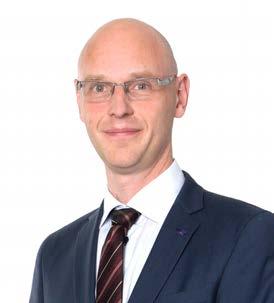
Lisbeth Dalgaard
Merchant,
Confederation of Danish Employers
Jens Maaløe
Chairman
Mikael Bay Hansen
Acting Chairman
Head of department, the Chairmans Office
Chairman, 3F – United Federation of Danish Workers
Troels Blicher
Danielsen
Appointed by the Danish Chamber of Commerce
Søren Sass
Chief Consultant, Danish Chamber of Commerce

Appointed by Confederation of Danish Industry
Michael Lumholt
CEO, Ticra
Clas Nylandsted
Andersen
Professional board member
Appointed by the Danish Federation of Small and Mediumsized Enterprises
Niels Techen Chairman, Danish Federation of Small and Medium-sized Enterprises
Professional board member
Appointed by the Confederation of Danish Industry
Appointed by the Economic Council of Labour Movement & the Danish Confederation of Trade Unions
Managing Director, TEKNIQ
Carsten Toft Boesen
CEO, NIRAS
Thomas Krebs
CEO, Vehicle builder and auto damage business organisation in Denmark
Preben Jakobsen
CEO, Nordtec Optomatic A/S
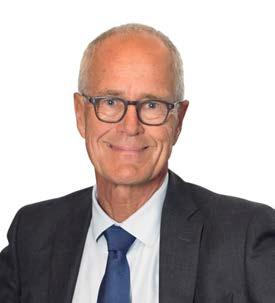
Appointed by the Danish Society of Engineers, IDA
Per Diget
Chairman of IDAs Commercial and Growth Committee, NIRAS Odense
Appointed by KL –Local Government Denmark
Sven Koefoed-Hansen
General Manager, Næstved Municipality
Appointed by Danish Agriculture and Food Council
Morten Andersen
Linnet
Chief Consultant Research and Education, Danish Agriculture and Food Council
Appointed by the Danish Association of Managers
Bjarne Henning Jensen
Team Manager, Danish Association of Managers
Appointed by Danish Regions
Kim Johansen
Regional Council member, Region of Southern Denmark
Elected by the Board of Representatives
Per Laursen
Senior Vice President
Pork Production, Danish Crown A/S
Mette Kynne Frandsen
Managing director, Henning Larsen
Appointed by the Institute’s Collaboration Committee
The Institute’s cooperative committee has appointed the following employee on the Board of Representatives to attend without voting rights:
Søsser Schmidt Service and event coordinator, Robot Technology, Danish Technological Institute
Her Majesty Queen Margrethe II of Denmark is the patron of Danish Technological Institute.
Her Majesty the Queen assumed the protectorate from his Majesty King Frederik IX.
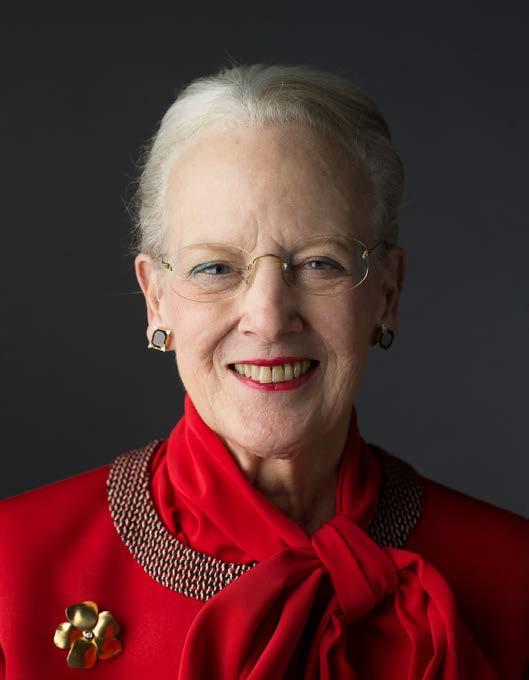
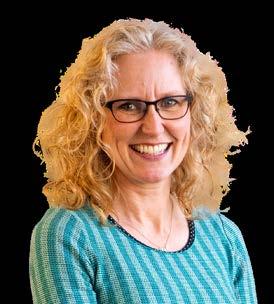
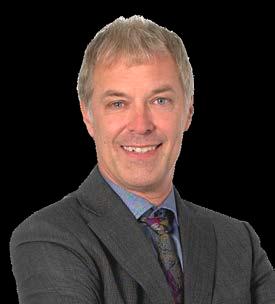
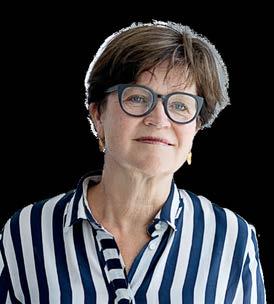
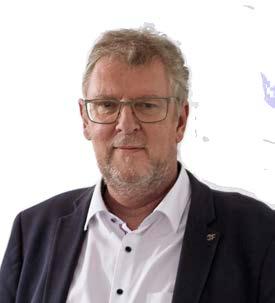

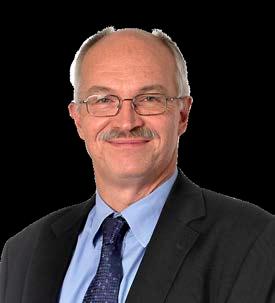

20th March 2023
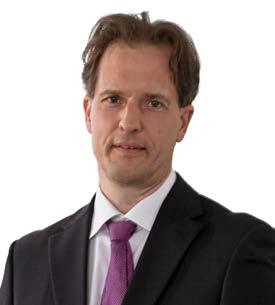





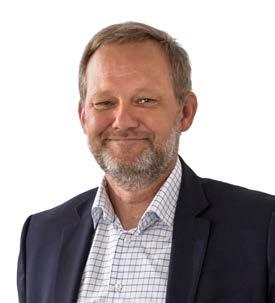
 Lotte Bjerrum Friis-Holm Employee Elected
Claus von Elling Chairman of Byggegruppen
United Federation of Workers in Denmark (3F)
Niels Techen Chairman
The Danish Federation of Small and Medium-sized Enterprises
Mette Kynne Frandsen Managing Director
Henning Larsen
Per Laursen Senior Vice President Pork Production Danish Crown
Frederik R. Steenstrup Employee Elected
Jens Maaløe Chairman Mikael Bay Hansen Acting chairman Head of Department, the Chairman's office Danish Metal Worker’s Union
Anders Bjarklev President Technical University of Denmark
Lotte Bjerrum Friis-Holm Employee Elected
Claus von Elling Chairman of Byggegruppen
United Federation of Workers in Denmark (3F)
Niels Techen Chairman
The Danish Federation of Small and Medium-sized Enterprises
Mette Kynne Frandsen Managing Director
Henning Larsen
Per Laursen Senior Vice President Pork Production Danish Crown
Frederik R. Steenstrup Employee Elected
Jens Maaløe Chairman Mikael Bay Hansen Acting chairman Head of Department, the Chairman's office Danish Metal Worker’s Union
Anders Bjarklev President Technical University of Denmark
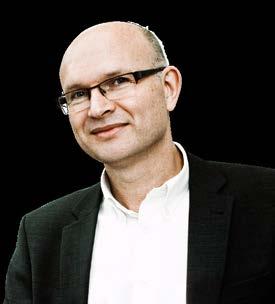
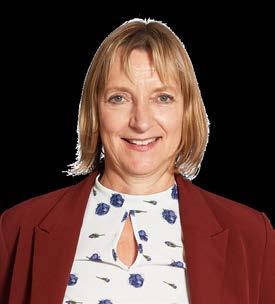
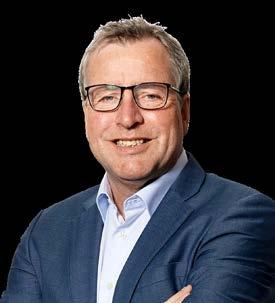
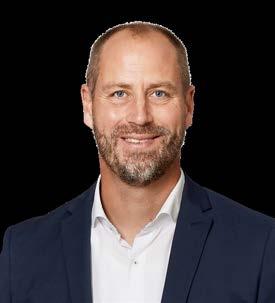




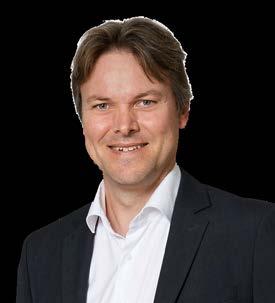
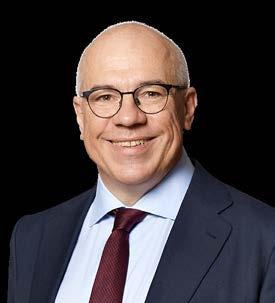

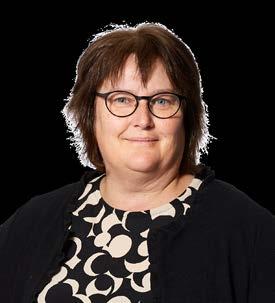

 Sune Dowler Nygaard Executive Vice President Environmental Technology
David Tveit Executive Vice President Energy and Climate
Mette Glavind Executive Vice President Building and Construction
Mikkel Agerbæk Executive Vice President Materials
Anne-Lise Høg Lejre Executive Vice President Food and Production
Juan Farré President
Sune Dowler Nygaard Executive Vice President Environmental Technology
David Tveit Executive Vice President Energy and Climate
Mette Glavind Executive Vice President Building and Construction
Mikkel Agerbæk Executive Vice President Materials
Anne-Lise Høg Lejre Executive Vice President Food and Production
Juan Farré President
Danish Technological Institute
Gregersensvej 1
DK-2630 Taastrup
Telephone: +45 72 20 20 00
Website: www.dti.dk
Email: info@teknologisk.dk
CVR No.: 56 97 61 16
Established: 1906
Headquarters: Taastrup
Financial year: 1 January - 31 December
Board of Trustees
Jens Maaløe, Chairman
Mikael Bay Hansen, Acting chairman
Anders Bjarklev
Per Laursen
Mette Kynne Frandsen
Claus von Elling
Niels Techen
Frederik R. Steenstrup
Lotte Bjerrum Friis-Holm
Executive Board
Juan Farré, CEO
Auditor
PricewaterhouseCoopers
Statsautoriseret Revisionspartnerselskab
Strandvejen 44
DK-2900 Hellerup
Subsidiaries
Notes:
Company with limited activity
Taastrup
Gregersensvej 1
DK-2630 Taastrup
Telephone +45 72 20 20 00
info@teknologisk.dk
Subsidiaries:
Danfysik A/S
Gregersensvej 8
DK-2630 Taastrup
Telephone +45 72 20 24 00
Telefax + 45 72 20 24 10
Aarhus
Teknologiparken
Kongsvang Allé 29
DK-8000 Aarhus C
Telephone +45 72 20 20 00
info@teknologisk.dk
sales@danfysik.dk
www.danfysik.com
Odense
Forskerparken Fyn
Forskerparken 10 F
DK-5230 Odense M
Telephone +45 72 20 20 00
info@teknologisk.dk
Dancert A/S
Gregersensvej 1
DK-2630 Taastrup
Telephone +45 72 20 21 60
www.dancert.dk
Sønder Stenderup
Gammel Ålbovej 1
DK-6092 Sønder Stenderup
Telephone +45 72 20 16 68
info@teknologisk.dk
DTI Spain S.L.
Avda. Cossetània 6-8 2º 4ª
43820 Calafell, Tarragona
Telefon +34 685 51 21 83
www.dmri.es
Skejby
Agro Food Park 15
DK-8200 Aarhus N
Telephone +45 72 20 20 00
info@teknologisk.dk
Follow us on:
Or read more here: www.dti.dk
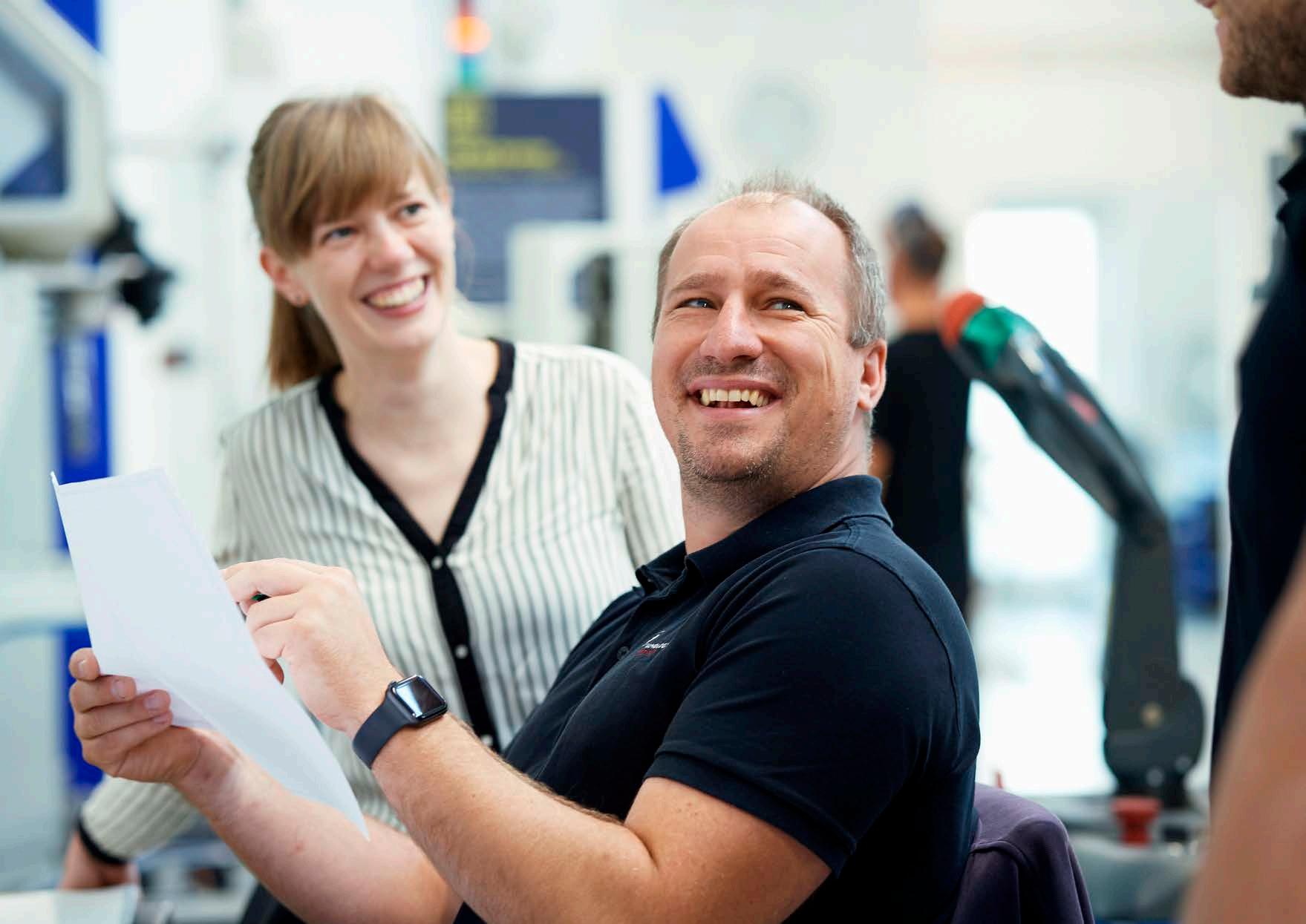
Review the summary financial statement for 2022:
We are 1,050 specialized employees at Danish Technological Institute. We work in an interdisciplinary environment to create technologies for a better future. We have a deep knowledge of technology that we translate into specific solutions - for the benefit of the business community and society at large.